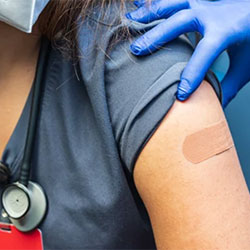By Gina Shaw
Originally published by our sister publication OR Management
Patients appear to be more willing to have surgery during a pandemic if both they and the hospital staff are vaccinated, according to a new study from researchers at the University of Chicago and Embry-Riddle Aeronautical University (Vaccine 2022;40[26]:3536-3539).

Patients may choose to delay surgery during a pandemic, even if the procedure is lifesaving, due to fears of viral exposure in a healthcare setting. In March 2020, a retrospective analysis from the Michigan Stroke Treatment Improvement Collaborative found a significant reduction in both ischemic stroke admissions and mechanical thrombectomy procedures for the most severe ischemic strokes compared with February 2020 and March 2019 (Neurosurgery 2020;87[3]:E397-E399).
“It’s critical to understand the factors that affect a patient’s decision to have surgery during an infectious pandemic if we want to help reduce deaths and illness. These factors include the vaccination status of the patient and hospital staff, need for the surgery, length of hospital stay, and urgency of the procedure,” said study co-author Keith Ruskin, MD, a professor of anesthesia and critical care at the University of Chicago, and member of the American Society of Anesthesiologists Committee on Patient Safety and Education, and husband of first author Anna Clebone Ruskin, MD.
“Having this knowledge could help guide healthcare institutions’ future vaccine resource allocations and policies for vaccine requirements,” Dr. Keith Ruskin said.
In the study, 2,006 American adults were surveyed about their willingness to undergo a hypothetical surgery during a hypothetical pandemic. Respondents were randomly assigned to one of two experimental conditions: Either the hospital requires all personnel to be universally vaccinated, or the hospital has no vaccine requirements. Consent to undergo surgery was then assessed under several circumstances, including the urgency of the surgery, hospital length of stay, vaccination status of the patient and the hospital’s vaccination policy for staff. For each scenario, study participants rated their willingness to undergo surgery on a Likert scale ranging from –3 (least likely) to +3 (most likely).
Understandably, participants said they were most willing to have surgery if it were a lifesaving procedure, if everyone was vaccinated, and if the procedure was done in an outpatient setting (+1.97). However, even with these hypothetical parameters, 15% of respondents were still reluctant to have lifesaving surgery.
“This may reflect distrust in the vaccine, in the hospital staff or in surgery itself,” the authors wrote. Participants were least willing to undergo surgery for an elective procedure with an inpatient stay, with both themselves and staff unvaccinated (–0.24).
“Making the choice to not have surgery for an actual health problem could increase the risk of potential illness and disease attributable to pandemic-related fears,” said Dr. Anna Clebone Ruskin, an associate professor of anesthesia and critical care at the University of Chicago. “This suggests a potential opportunity for public education.”
Dr. Keith Ruskin urged clinicians, including surgeons and anesthesiologists, to take a more active role in educating patients about vaccines. “Sadly, there are media platforms that are making a profit out of spreading vaccine-related conspiracy theories,” he said. “We need to learn the same skills to help our patients to explain the advantages of getting vaccinated, particularly if they are considering something like surgery. When someone sees their physician for an annual checkup or meets with a surgeon about an upcoming surgical procedure, that’s a critical time for one-on-one education.”
Funding for healthcare advocates during the pre-habilitation period before surgery could also be useful, Dr. Anna Ruskin said. “You can’t change someone’s mind in a single visit; it takes time,” she said. “When we sense that someone is hesitant to have a potentially needed surgery, we could flag them for a follow-up call from a healthcare advocate who can address their concerns whether they be over vaccination, the safety of the hospital, or other questions about the surgery. That requires funding, but in the long term it could save money.”
In one post hoc analysis of the study data, the authors found that people who were actually vaccinated against COVID-19 were somewhat less likely to choose to have surgery. “One potential explanation is that getting vaccinated against COVID is correlated with a lower risk tolerance in general,” Dr. Keith Ruskin said. “That’s one future research question we want to answer. If you got vaccinated against COVID, are you less likely to, say, ride a motorcycle?”
Nevertheless, there were extremes at both ends of the spectrum. “Some people said that even if they were not vaccinated and the hospital did not require staff vaccination, they would still be willing to undergo elective surgery with an inpatient stay, while others would not undergo even lifesaving outpatient surgery with universal vaccination during a pandemic,” Dr. Keith Ruskin said. “We’re trying to formulate studies now to help us understand why those people made the decisions they did.”
{RELATED-HORIZONTAL}
